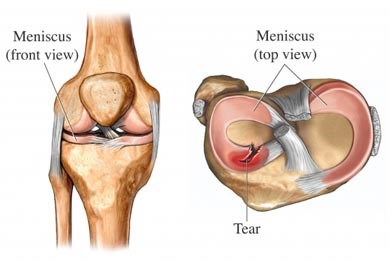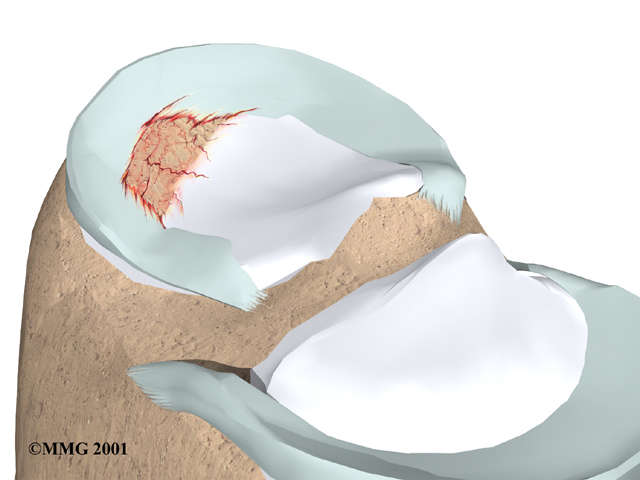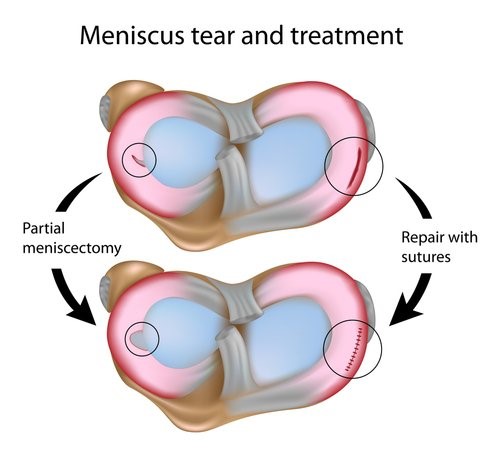
Anatomy of the meniscus and an example of a meniscus tear
A meniscus tear is a knee joint injury. The shock absorber of the knee is what gets damaged. The meniscus is a soft cartilage sitting between the shinbone and the thighbone, and its main function is to provide the knee joint with cushion and stability. A tear is a very common injury for the meniscus and is one of the most common reasons for knee pain. There are different types of meniscus tears, and they require different types of treatments. Sometimes surgery is necessary and other times it is not. There are many different treatment options for meniscus tears. Below is a detailed article on common meniscus tear treatments.
Diagnosis
If you have had pain for several weeks, swelling, catching, or locking of your knee, you may have a meniscus tear. The first thing you should do is to visit an orthopedic specialist. Your orthopedist will examine you, take x-rays and tell you what the possible causes are. He may suggest that you have an MRI which is a non-invasive test that can see inside your knee. If you have a meniscus tear, the different treatment options will be explained to you.

Non-surgical options
The pain from smaller meniscus tears can be treated with rest, anti-inflammatory drugs, therapy, and steroid injections. These measures decrease pain and swelling in the joints. The type and size of the tear, patient age, associated arthritis as well as the physical demands of the patient are all considered in the treatment decision. Anti-inflammatory medicines, cortisone injections, and therapy are common non-surgical treatments. If non-operative treatment does not provide relief, surgery may be required.

Meniscectomy and meniscus repair
Surgical options
When a meniscus tear is small and not painful, conservative treatment can be successful. However, when a meniscus tear gets symptomatic or interferes with activities, surgery may be the best option. Fortunately, the surgery is done arthroscopically and with minimum invasion. Usually, surgery is very effective if the primary symptoms of a torn meniscus are mechanical, which means they cause a locking or a catching sensation at the knee.
Arthroscopic Meniscectomy
An Arthroscopic Meniscectomy is the procedure used to remove the torn parts of a meniscus. This is the more common treatment for a meniscus tear compared to meniscus repair. This surgery option removes the damaged part while trying to leave as much of the healthy meniscus as possible. The healing process is fast and easy, which means a quick recovery and a quicker return to activities.
Meniscus repair
A meniscus repair is a procedure that is done to repair a damaged meniscus. This surgery can be done if the tear is simple and in a part of the meniscus that has a good blood supply. A meniscus repair surgery requires a longer recovery compared to meniscectomy.
Postoperative physical therapy is very important to getting the maximum recovery possible. The focus of the therapy is to restore motion and regain strength so the knee is strong and well supported.
Long-term prognosis
When a meniscus is torn, the shock absorbing ability of a knee is decreased. When this happens the risk of developing damage to the surface of the knee joint is increased. When a person loses the meniscus, they place more burden on the surface cartilage, and the risk of developing wear-and-tear arthritis is increased. There are several ways patients can decrease their risk of developing arthritis after sustaining a meniscus tear. These include weight loss, low impact exercises, strengthening of core muscles, as well as preventing further trauma to the knee joint.
Many patients who have symptomatic meniscus tears that require surgery also have some arthritis in their knee. Osteoarthritis cannot be relieved with arthroscopic surgery. Fortunately, many patients who have surgery for their meniscus tears can return to their activities despite having osteoarthritis. Sometimes additional treatments such as injections can be very effective in providing relief from the arthritis pain.
If you have had knee pain for more than a few weeks accompanied with catching and loss of movement, you should see an orthopedic specialist right away to get help. You may have a meniscus tear or another condition that will not go away unless you get treatment.
